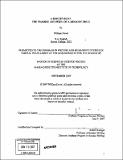A bright idea? : the promise and peril of a memory drug
Author(s)
Dowd, William (William Michael)
DownloadFull printable version (2.728Mb)
Alternative title
Promise and peril of a memory drug
Other Contributors
Massachusetts Institute of Technology. Graduate Program in Science Writing.
Advisor
Robert Kanigel.
Terms of use
Metadata
Show full item recordAbstract
In the MIT lab of neuropharmacologist Richard Wurtman, rodents that received a new Alzheimer's drug have shown a marked improvement in learning and memory. They are able to master elaborate mazes in half the time of their all-natural counterparts. Wurtman theorizes that the memory loss and dementia associated with Alzheimer's disease is caused not by amyloid plaques and tangles but by a gradual deterioration of the brain's synapses. Wurtman's drug-a cocktail of three dietary supplements including uridine, choline, and an omega-3 fatty acid called DHA-is designed to generate more synapses. The three ingredients deliver the stimulus and raw material needed to create more phosphatidylcholine, a major component of neuronal membrane. More membrane, the thinking goes, means more neuronal encounters, more synapses, and more relayed messages. Wurtman's cocktail has just entered a massive clinical trial involving 10,000 Alzheimer's patients spread across 10 European countries. The same drug that could preserve brain function in Alzheimer's patients also has potential as a memory drug for healthy people. This thesis explores the ethical questions surrounding such biotechnological enhancement. What might be the benefits and drawbacks of taking a memory booster? Could a class-like division eventually arise between those who get the drug and those who do not? Could the molecular manipulations of a smart drug-what some call "cosmetic pharmacology"--change qualities that are inextricable from who we are?
Description
Thesis (S.M. in Science Writing)--Massachusetts Institute of Technology, Dept. of Humanities, Graduate Program in Science Writing, 2007. Includes bibliographical references (leaves 49-51).
Date issued
2007Department
Massachusetts Institute of Technology. Graduate Program in Science Writing; MIT Program in Writing & Humanistic StudiesPublisher
Massachusetts Institute of Technology
Keywords
Graduate Program in Science Writing.